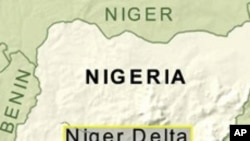Nigeria's 194,000-kilometer network of roads has deteriorated over the years and now poses grave danger to motorists. Bad roads are now one of the major causes for road deaths in Nigeria.
It was complete mayhem on the ever-busy Warri-Port Harcourt road as motorists meandered through large portions of a crumbled main arterial highway, amidst shouting and arguments over passage.
A taxi driver in the Niger Delta, Yakubu Ochuko, tells VOA roads in the region, where they exist at all are often impassable. He says motorists have become more vulnerable to robberies.
"At times six hours we will be in a hold up because of the bad spots," said Yakubu Ochuko. "And it is an opportunity for the robbers to rob because as you slow down at the bad spots they rob you. Many occasions they rob us like that because of the bad roads."
Nigerian roads are crumbling faster than they can be fixed. The worse stage roads are in, the quicker cars and trucks deteriorate, driving up maintenance and repair costs. It is a financial burden for drivers who are forced to replace tires and pay for other repairs. Patience Aguma, a commercial vehicle operator, talks about her frustrations.
"Getting to Asaba here before going back, before I get to Ughelli, my car will break down because of the potholes," said Patience Aguma. "The potholes are too big, too bad. It destroys my motor [vehicle]. If I work 2,000 naira [about $15] a day, I spend 6,000 naira [about $40] every time. So I am even tired of the work because of the bad roads."
Equally traumatic are the long delays she encounters on the highways.
"Before when the road was good it will take me one hour 30 minutes to Asaba," said Aguma. "But now if I am coming from Ughelli to Asaba it will take me two hours and thirty minutes because of the bad spots on it."
Drivers trying to avoid potholes and dilapidated portions of the roads end up putting other people's lives at risk. Last month, 80 people were killed when an oil tanker exploded and caught fire in the southeast when it crashed while trying to avoid potholes. Five passenger buses were involved in the accident.
Truck drivers say they will withdraw their vehicles if the government fails to fix the roads in the next few months.
More than 5,000 premature deaths per year occur on Nigeria's roads.
But while bad roads is considered one of the main causes for road accidents, an official of the Federal Road Safety Corp, Luka Ipkai, blames reckless and dangerous driving, over speeding and vehicle defects as contributing to the carnage on Nigerian roads.
"Accidents on the roads is not more peculiar to bad roads because you see some of the roads that are very good, yet people over speed and have accidents," said Luka Ipkai. "Some people take more precautions on the bad roads. Motorists should be very cautious when they are moving, whether on bad roads or good roads."
Besides the pathetic condition of roads, drivers of large trucks tend to encroach on the highways, impeding the free flow of traffic and contributing to accidents and deaths.
The manager of a local transport company, Anthony Okpara, explains.
"There is no parking space," said Anthony Okpara. "The big lorries they park by the road side. They are causing 'go slow'-they are slowing the work of the transport service. All these trailers they park on the sides of the roads, they are disturbing."
The government plans to commit about $1 billion under the 2010 national budget to fix its transport infrastructure. Analysts say at current funding levels, Nigerian roads will continue deteriorating, contributing to high transport costs in Africa's most populous nation.
Nigeria's 194,000-kilometer network of roads has deteriorated over the years and now poses grave danger to motorists. Bad roads are now one of the major causes for road deaths in Nigeria.





